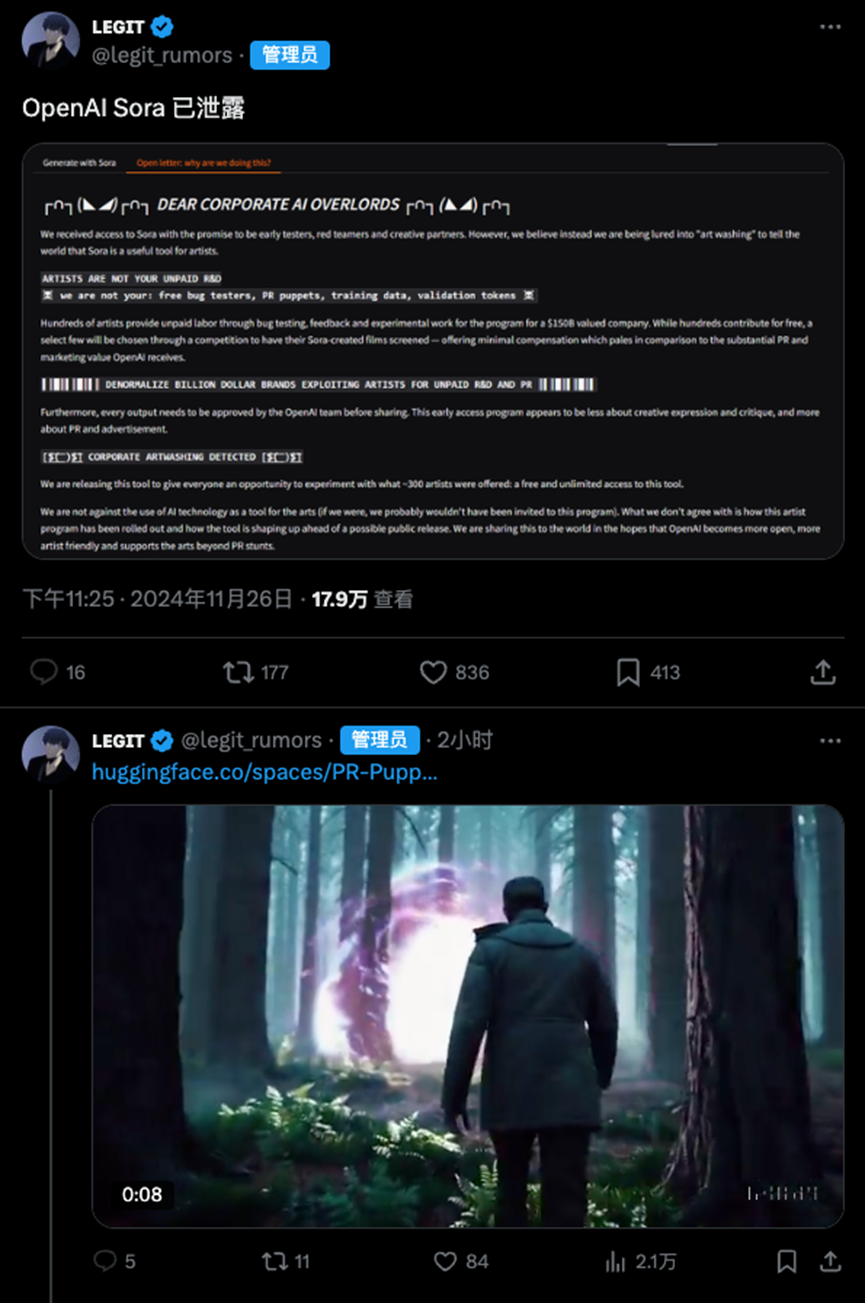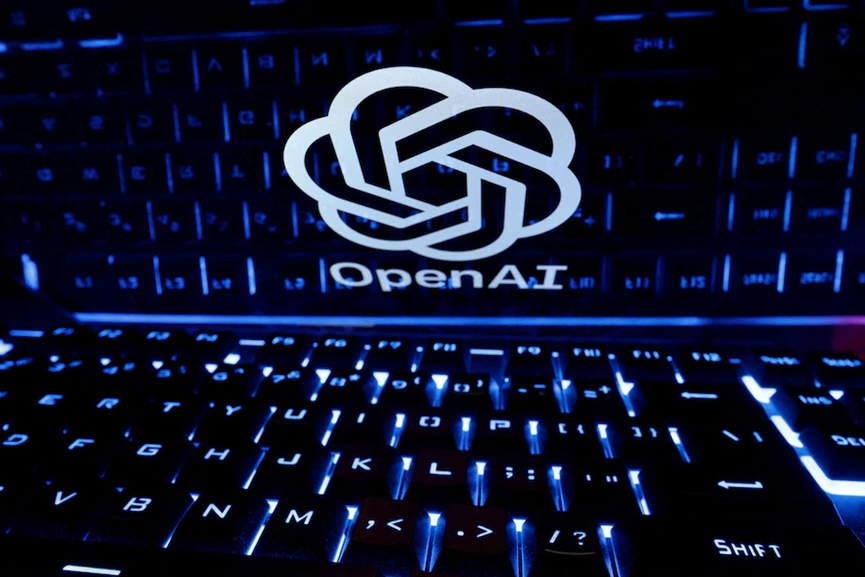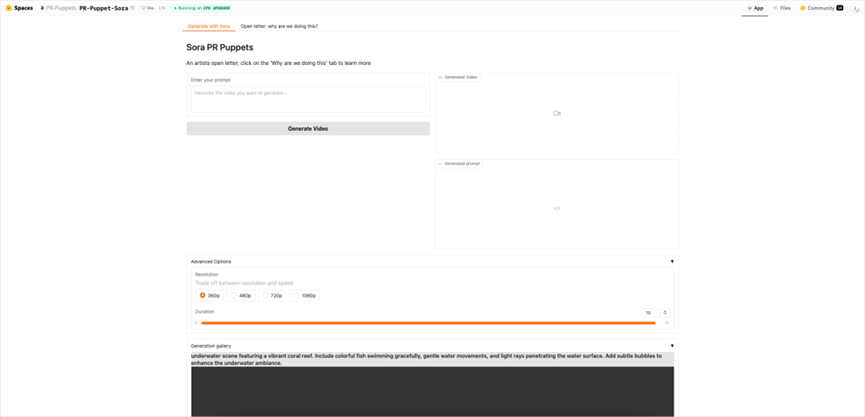OpenAI suspende acesso ao modelo de vídeo Sora, artistas protestam contra o tratamento recebido

Esta manhã, ao abrir as notícias, vi que a fuga do Sora estava gerando uma grande discussão no X (antigo Twitter). Após investigar um pouco mais, descobri que alguém havia carregado diretamente na Huggingface a interface fornecida pela OpenAI para artistas na fase de testes privados, permitindo que qualquer pessoa a utilizasse. Após o incidente, a OpenAI anunciou a suspensão do acesso ao Sora e iniciou uma investigação sobre o ocorrido. O que aconteceu para que essa situação tomasse proporções tão grandes? Vamos fazer um panorama sobre esse evento.

Contexto: Sora — Uma ferramenta de geração de vídeos com IA que chamou a atenção
Sora é uma ferramenta de geração de vídeos com inteligência artificial recém-lançada pela OpenAI. No início, a OpenAI forneceu acesso gratuito a essa ferramenta para centenas de artistas com o objetivo de coletar feedback e melhorar o sistema. Em troca, esses artistas não só puderam experimentar uma tecnologia de ponta, como também tiveram a oportunidade de exibir suas criações em mostras públicas. No entanto, ao usar a ferramenta, os artistas perceberam que a abordagem da OpenAI era injusta, especialmente no que diz respeito à remuneração e ao reconhecimento por suas contribuições.

A protesto dos artistas: trabalho não remunerado e "marionetes publicitárias"
Um grupo de artistas iniciou uma manifestação coletiva, afirmando publicamente que a OpenAI não os compensou adequadamente pelo trabalho não remunerado e que os utilizou como "marionetes publicitárias" para promover a imagem da empresa. Eles afirmam que, embora a OpenAI tenha oferecido "acesso antecipado" à ferramenta, o trabalho de fornecer feedback, testar bugs e criar obras experimentais não foi devidamente recompensado financeiramente.
Para chamar mais atenção para o problema, os artistas vazaram o acesso ao Sora para o público e criaram uma página na web permitindo que qualquer pessoa usasse a ferramenta para gerar vídeos. Embora a página tenha ficado no ar apenas por três horas, seu impacto gerou uma discussão ampla.
O link (que não está mais disponível quando publico este artigo): https://huggingface.co/spaces/PR-Puppets/PR-Puppet-Sora

Resposta da OpenAI: suspensão do acesso e investigação
Após o incidente, a OpenAI reagiu rapidamente e anunciou a suspensão do acesso ao Sora para todos os usuários, afirmando que iniciaria uma investigação. Niko Felix, porta-voz da OpenAI, declarou em um comunicado: "Embora os artistas que participaram dos testes tenham feito isso de forma voluntária, seu feedback e trabalho experimental foram essenciais para o desenvolvimento do Sora. Milhares de artistas participaram do desenvolvimento do Sora, ajudando-nos a definir novas funcionalidades e medidas de segurança", disse ele. "A participação foi voluntária e não houve exigência de feedback."
Embora a OpenAI tenha enfatizado que a participação foi voluntária, os artistas acreditam que suas contribuições não foram adequadamente recompensadas, e que essa "voluntariedade" esconde um tratamento injusto de seu trabalho.
A forma de protesto: "vazamento" que quebra as convenções da indústria
Essa manifestação é particularmente notável na indústria de IA, porque, no processo tradicional de testes de IA, os participantes geralmente precisam assinar um acordo de confidencialidade (NDA) e as empresas controlam rigorosamente a publicação de qualquer feedback externo. O "vazamento" realizado pelos artistas quebrou essa convenção, e muitos na indústria consideram esse tipo de crítica pública como extremamente raro. Por meio de sua ação, os artistas desafiaram a forma como as empresas gerenciam a circulação de informações durante os testes com usuários, pedindo mais transparência e responsabilidade.
A posição dos artistas: apoio às ferramentas de IA, mas contra o tratamento injusto
Os artistas deixaram claro que não são contra o uso da IA na criação artística, mas são contra o tratamento recebido pela OpenAI em relação ao trabalho deles. Em sua declaração, escreveram: "Não somos contra o uso de tecnologia de IA na criação artística; se fôssemos contra, provavelmente nem teríamos participado deste projeto". Eles enfatizaram que, embora sua participação tenha ajudado a OpenAI a melhorar o produto, esperam ver mais recompensas em troca, e não querem ser tratados apenas como "ferramentas de relações públicas" para a empresa.
Além disso, os artistas lançaram uma carta aberta para mobilizar mais pessoas a se engajarem com a questão. Até o momento, quase 100 pessoas assinaram a carta de apoio a essa causa.
Vozes discordantes: RAC refuta a posição dos manifestantes
Vale notar que nem todos os artistas que participaram dos testes do Sora concordam com a posição dos manifestantes. O músico André Allen Anjos (nome artístico RAC) declarou em entrevista que a maioria dos participantes estava empolgada com o projeto e acreditava que a equipe da OpenAI "fez o que era certo". Ele afirmou que os artistas foram respeitados durante os testes e que a experiência foi positiva. Devido ao acordo de confidencialidade, ele não pode compartilhar mais detalhes, mas deixou claro que não apoia a posição dos protestantes.
Controvérsia anterior: Problemas com os dados de treinamento do Sora
Na verdade, antes mesmo dos testes públicos, o Sora já havia gerado preocupações devido a problemas potenciais de privacidade e uso de dados. Mira Murati, ex-CTO da OpenAI, evitou responder publicamente se o Sora usou vídeos do YouTube para treinamento, o que acabou gerando uma controvérsia adicional sobre a ferramenta.
Conclusão: A arte e a equidade na era da IA
A tecnologia e a arte devem ser uma relação de mútuo enriquecimento, e não um processo unidirecional. A IA pode oferecer novas possibilidades para a criação artística, mas, se os direitos legítimos dos criadores forem ignorados, essa fusão entre tecnologia e arte perde seu equilíbrio. Essa mentalidade de "doação" revela o desdém das empresas pelas contribuições dos criadores e reflete, no fim das contas, uma má compreensão do valor dos criadores. Quanto à forma como a OpenAI lidará com essa situação, espero que eles melhorem suas práticas, especialmente ao encontrar um equilíbrio entre o código aberto e os direitos dos criadores. Por fim, seu apelo pelo código aberto é louvável, pois o código aberto realmente favorece o compartilhamento de tecnologia e inovação, permitindo que mais pessoas participem e impulsionem o desenvolvimento da indústria como um todo.